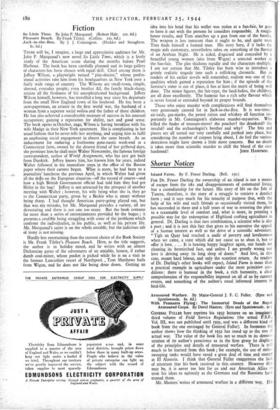Fiction
So Little Time. By John P. Marquand. (Robert Hale. rm. 6d.) Pleasure Beach. By Frank Tilslcy. (Collins. Los. 6d.) Jack-in-the-Box. By J. J. Connington. (Hodder and Stoughton.
8s. 6d.)
THERE will be, I imagine, a large and appreciative audience for Mr. John P. Marquand's new novel So Little Time, which is a lively study of the American scene during the months before Pearl Harbour. The book has been carefully planned and its large gallery of characters has been chosen with equal skill. Chief among them is Jeffrey Wilson, a. playwright turned " play-doctor," whose profes- sional activities take him from his headquarters in New York over a fairly wide range of country. The Wilsons are small-town, simple, shrewd, everyday people; even brother Alf, the family black-sheep, retains all the freshness of his unsophisticated background. Jeffrey Wilson himself, however, has travelled a long way since his departure from the small New England town of his boyhood. He has been a newspaperman, an aviator in the first world war, the husband of a woman from a superior social milieu and the father of three children. He has also achieved a considerable measure of success in his unusual occupation; gaining a reputation for ability, tact and good sense. The book opens in October, 1940, Wilson is having breakfast with his wife Madge in their New York apartment. She is complaining in her usual fashion that he never tells her anything, and urging him to fulfil an unpleasing social engagement in almost the same breath. As an inducement for enduring a loathsome gone-rustic week-end at a Connecticut farm, owned by the dearest friend of her girlhood days, she promises him he shall meet Walter Newcombe, the famous foreign correspondent, author of World Assignment, who has just got back from Dunkirk. Jeffrey knows him, has known him for years, indeed Walter followed in his immediate steps in the office of the Boston paper where their careers began. What is more, he had been to a journalists' luncheon the previous April, in which Walter had given all the dof,e on the European situation—off the record of course—and how a high British Government official had told him they had got Hitler in the bag! Jeffrey is not attracted by the prospect of another meeting with Walter ; however, his wife being what she is, they go to the Connecticut party, given by a Beckie who is smart without being sharp. I had thought American party-going played out, but that was my mistake, for Mr. Marquand provides a variety, all are devastating and there is not one too many. But the book contains far more than a series of entertainments provided by the bogusit presents a credible being struggling with some of the problems which confront the individualist, in his public, as well as his private life. Mr. Marquand's satire is on the whole amiable, but the judicious salt of irony is not missing.
Hardly less entertaining than the current choice of the Book Society is Mr. Frank Tilsley's Pleasure Beach. Here, as the title suggests, the author is in holiday mood, and he writes with an almost Dickensian gusto of the adventures of an amiable, honest, if rather dumb coal-miner, whose pocket is picked while he is on a visit to the famous Lancashire resort of Northpool.. Tom Matthews hails from Wigan, and he does not like being done down. Getting an idea into his head that his wallet was stolen at a fun-fair, he goes to have it out with the persons he considers responsible. A rough- house results, and Tom snatches up a gun from one of the booths. The weapon is less innocent than it ought to be, and quite soon Tom finds himself a hunted man. His story here, if it lacks the . magic aids customary, nevertheless takes on something of the flavour of an Arabian Night. He is aided, disguised and concealed by a beautiful young woman (also from Wigan) a seasonal worker at the fun-fair. The plot thickens rapidly and the characters multiply. I am not certain that Mr. Tilsley has been wise to introduce a grimly realistic tragedy into such a rollicking chronicle. But as readers of his earlier novels will remember, realism was one of the qualities which gained a reputation for him ' • if the episode of the heroine's sister is out of place, it has at least the merit of being well done. The minor figures, the fair-type, the land-ladies, the children, are all done excellently. The humour has a rich salty flavour which is never forced or extended beyond its proper bounds.
Those who enjoy murder with complications will find themselves very generously catered for in Jack-in-the-Box. It is war-time: air-raids, gas-masks, the petrol ration and whiskey all function im- portantly in Mr. Connington's elaborate murder-mysteries. Who killed the finder of treasure-trove? the poacher? the drunkard? the invalid? and the archaeologist's brother and why? The bits and pieces are all sorted out very carefully and pushed into place, but considering the number of corpses lying about, I do feel the various detectives might have shown a little more concern. But no doubt it takes more than scientific murder to chill the blood of the case


























 Previous page
Previous page